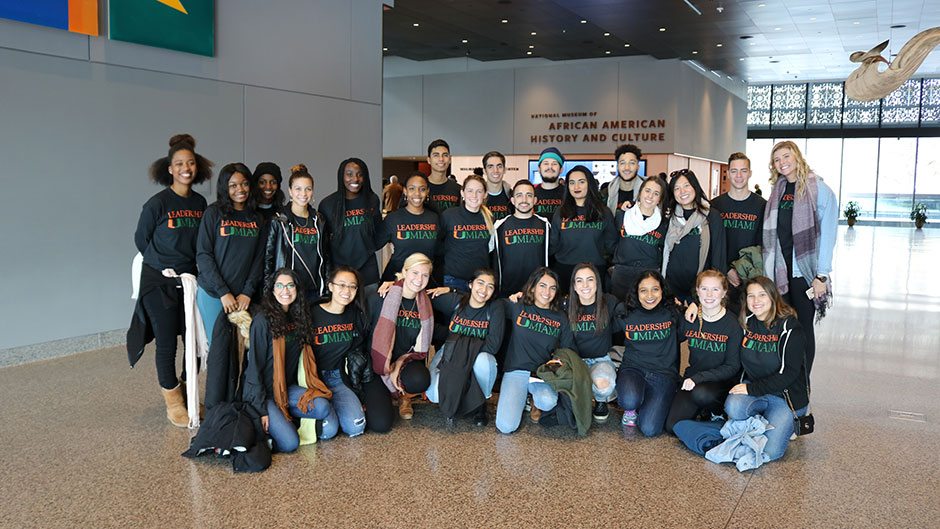Prior to her senior year at the University of Miami, the most politically active public health major Shaitia Martin had ever been was to vote in the 2016 presidential election.
“There are a lot of social issues that I am passionate about changing,” she said, “but how do you mobilize? How do you start?”
The University’s Butler Center for Service and Leadership launched Leadership UMiami to help students answer those questions. This semester, Martin was among 24 select upperclassmen who met for eight weeks to uncover what democracy means on a personal, community, and national level. The participants were split into three groups, each exploring one of three social issues—education reform, immigration, or racial justice.
Other Butler Center programs, such as First Year U and Impact, help freshman and sophomore students develop their leadership potential and get involved on campus, but Director Andrew Wiemer wanted to create a program that caters to upperclassmen students and focuses specifically on civic participation.
“[Through Leadership UMiami] we are giving them the tools and frameworks as students so that when they graduate, they have the knowledge and understanding of what they can do for their communities,” Wiemer said.
Over the course of the program, participating students met with civic leaders in the Miami community, including the mayor of Key Biscayne, deputy mayor of Miami-Dade County, and the Coral Gables city attorney, and attended informative site visits at community organizations and agencies.
The program culminated in a trip to Washington, D.C., where the group continued to explore the democratic process on a national level. Activities included a visit to the National Museum of African American History and Culture; interaction with leaders at Young People For (YP4), International Rescue Committee (IRC), and The Campus Vote Project, and NASPA—Student Affairs Administrators in Higher Education; and a tour of the Capitol Building courtesy of staff members from South Florida Congresswoman Ileana Ros-Lehtinen’s office.
Students in the cohort-style program learned not only from their broadened political outreach but also from each other.
“The allure to the program, in addition to offering us the tools that we want and need, was that there were other students who are passionate about the same things I am passionate about but from all different backgrounds,” Shaitia said. “So they came in with very unique perspectives, histories, and insights on things that I had never thought about before.”
At an end-of-semester luncheon hosted by the Butler Center, each group was tasked with presenting a five-minute summary of lessons learned and potential action items and solutions for the issue. Groups’ discussions on overcrowding in schools, the lengthy and difficult process of naturalization, and the school-to-prison pipeline demonstrated the students’ in-depth understanding.
The racial justice group highlighted racial discrimination in the criminal justice system, particularly the fact that nearly a quarter of African Americans in Florida do not have the right to vote due to prior felonies on their record. They brought petitions protesting voter disenfranchisement for attendees of the luncheon to sign.
For senior neuroscience major Sirisha Gaddipati, who is on the Pre-Med track, Leadership UMiami gave her the spark she has been seeking. She hopes to continue deepening her knowledge about social issues so she can one day apply it to reducing disparities in the health care field.
“I have always been interested in health care, but I have been looking for something more,” she said, “and all of these issues are tied back to health care.”
Both Wiemer and Vice President for Student Affairs Patricia A. Whitely are thrilled with the outcome of the program and plan to continue and expanding it for years to come.
“It has been incredible for me to see the sense of community that was developed between students participating in the inaugural year,” Wiemer said. “I’m looking forward to how this innovative and unique leadership program will continue to grow and further provide our UM students experiences around democracy and social change.”

